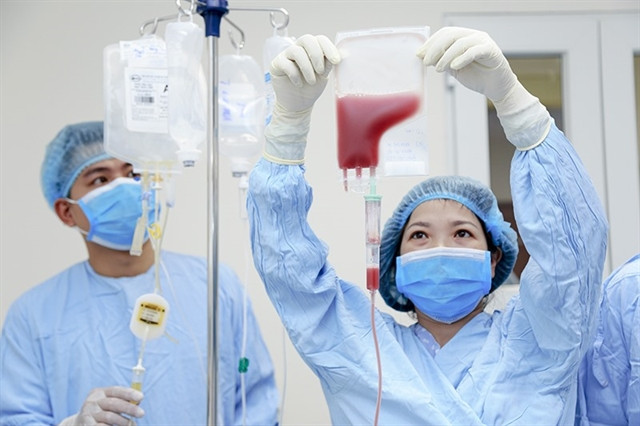 |
| Blood research scientists at the National Institute of Hematology and Blood Transfusion in Hà Nội. — Photo Cong Thang |
Belgium and American experts will train cell therapy technology and transfer CAR-T cell culture techniques to the National Institute of Hematology-Blood Transfusion (NIHBT) to improve the ability to diagnose and treat blood diseases in Việt Nam, participants heard at the National Conference on Hematology-Blood Transfusion on November 24-25.
The country’s largest scientific conference of haematology-blood transfusion attracted the participation of nearly 1,500 delegates who are international experts from the United States, Belgium, Singapore and domestic scientists.
Experts discussed the cooperation project on training and technology transfer on cell therapy implemented by the University of Liège, Belgium and the National Institute of Hematology-Blood Transfusion.
The project aims to support training and technology transfer on cell therapy at the University of Liège in Belgium for three years (2022-2024). The overall goal of the project is to strengthen the training of medical staff in cell therapy techniques, specifically training medical staff on developing sources and the application of cell therapy in practice in Việt Nam for malignancies and chronic blood diseases.
In addition, experts will provide on-site training on mesenchymal stem cells, JAICE stem cell quality standards, and clinical stem cell transplants. It is expected that the project will train human resources and serve as a basis for implementing cell therapy in Việt Nam in the coming years.
Also within the framework of the conference, Dr. Richard Childs, Clinical Director of the National Heart, Lung, and Blood Institute (NHLBI) at the National Institutes of Health, also worked with the NIHBT on the preparation for the CAR-T cell culture technology transfer project.
 |
| The country’s largest scientific conference of haematology-blood transfusion attracted the participation of nearly 1,500 delegates who are international experts from the United States, Belgium, Singapore and domestic scientists. — Photo NIHBT |
NIHBT director Assoc. Prof. Dr Nguyễn Hà Thanh said that the haematology-blood transfusion sector has made very rapid progress in recent years.
“Now we have done most of the latest techniques that the region and the world are doing such as targeted treatment with the latest drugs, hematopoietic stem cell transplants, and high-quality blood transfusion for patients. We have also implemented programmes on preventing thalassemia to improve the quality of life for patients with inherited blood diseases," said Hà.
Specifically, Việt Nam has applied the world's advances in targeted drugs in the treatment of blood cancer, successfully carried out an epidemiological survey on thalassemia nationwide and a genetic screening programme towards gradually reducing the number of children born with the hemolytic disease in some localities. The sector also focused activities on stem cell transplant activities with the successful transference of autologous stem cell transplant techniques to many hospitals in provinces and cities across the country.
The industry also achieved positive results in the study of gene mutations in blood cancers, thalassemia, and Hemophilia, contributing to improving the quality of treatment and pre-diagnosis of hereditary blood.
Hà added that the conference was an opportunity for scientists and officials in the industry to meet, share experiences, and update new techniques and advances in the diagnosis and treatment of blood diseases.
At the forum, experts and scientists focused discussion on topics such as Clinical Hematology, Subclinical, Blood Transfusion, Stem Cells, Coagulation, Thalassemia, and Immunology - Genetics - Molecular Biology. They also shared achievements and advances in the field of stem cell transplants, mesenchymal stem cells - clinical applications and cell therapy.
In the coming time, the haematology-blood transfusion sector will focus on the development of the latest techniques such as Hematopoietic stem cell transplants, mesenchymal stem cell transplants, cell treatment (such as CAR-T cell therapy), and targeted therapy with new drugs. These therapies will help to predict and treat patients much more accurately than before, helping patients to better improve their quality of life and recover from illness in some cases. — VNS